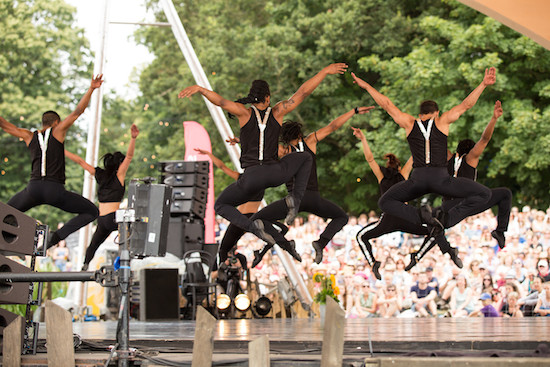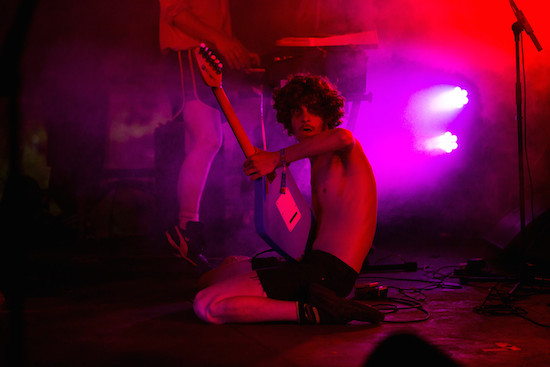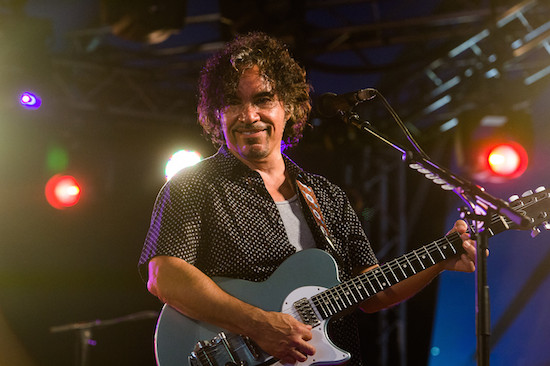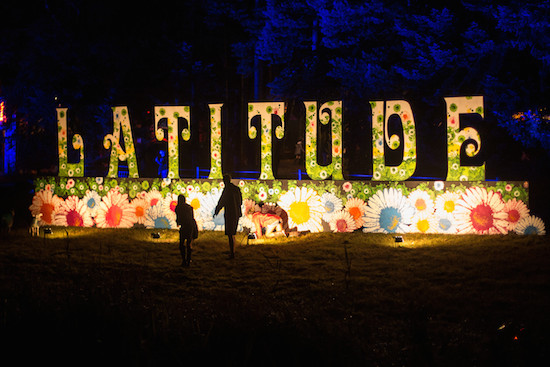It’s definitely festival and not music festival
Most music festivals consist of a pretty standard timetable of clambering out your tent, persevering through a few bands in which you hold little interest, and hopefully glugging down enough overpriced plastic cupfuls of drink in time to enjoy the headliners you and your mates really want to see. Not Latitude. On Sunday I spend a good two hours in a film tent, firstly watching Teeth Of The Sea live soundtrack a mashed up version of Michael Radford’s dangerously dark film version of Orwell’s Nineteen Eighty-Four, and followed by a discussion asking "how close is our world to that of Orwell’s Nightmare?" with representatives from CERN. This is no mere bacchanal celebration; this is a weekend spent in cultural reflection mode (admittedly fuelled with copious alcohol). Teeth Of The Sea’s unsettlingly minimal score peaks and troughs while images of dystopic torture and pain flash up on screen in the dim tent, Richard Burton bleakly staring down upon us minions below as flies in need of swift swatting.
If you want to get inspired, skip Rudimental – head to the poetry tent
The most misunderstood of all art forms is given an entire tent at Latitude, stuffed to the brim for three days straight with more romance, passion and wit than the rest combined. Pretty early on the Friday I clock it as a safe spot; consistently reliable as a source of giggles and tears (and shade) as a lengthy parade of fresh-faced unknown poets step up to try out their ramblings on an entirely different audience from their usual committed relative few. Friday’s MC Luke Wright knocks things out the park, setting the tone to one of witty discomfort, and discontent with the total shit that is modern Britain, loosely surmised in rhyme and quips. Another early highlight is the ballsy sing-speak of Yorkshirewoman, Jemima Foxton, who struts about the stage chasing that final cadence further out of reach as her poems reach exponentially higher, verbalising an entire generation’s discontent. "Rich people don’t stay up late trying to fix the world," she says, "I think they’ve forgot, it’s broken."

Contemporary dance belongs outside.
Latitude’s Waterfront Stage is a pretty idyllic sight when the sun’s out, with open air dance and theatre productions playing out on a floating platform jutting out across the river that cuts through the gorgeous Henham park. With punts criss-crossing behind the stage and under the bridge, and countless spontaneous picnics setting up, the midday atmosphere by the water is of the sort of garden party delight Sebastian Flyte would’ve indulged in. Aptly, dancers from Random Dance – esteemed British choreographer, Wayne McGregor’s company – are set to perform their recent full-length piece, Atomos in its unabridged entirety. The open-air floating platform necessitates the elimination of all the sets and projections that anchored the original production, and the momentous ambient neoclassical score by A Winged Victory For The Sullen is this time recorded rather than live, but despite all this, the piece retains its singular beauty.
A cast of ten dancers, clad in minimal attire, swan out on to the platform while the droning opening chords of the score blast over the water. Structurally, the company live up to their name, and McGregor’s signature stream-of-consciousness corporeal syntax is well represented, aligning themselves in geometric patterns, and jerking, turning and moving restlessly to the beatless score for a full hour. Anybody who’s seen the video for Radiohead’s Lotus Flower or Atoms for Peace’s Ingenue, both of which were choreographed by McGregor, has seen the man’s bendy modus operandi, here taken to its furthest yet extent. The dancers group into twos and threes, undertaking superhuman lift after superhuman lift, and occasionally contorting themselves beyond the apparent limits of possibility. Under the absolutely baking noonday sun, the full-length of the piece becomes too much for many, who duck out in search of shade in the nearby forest. But I remain entranced. The ten dancers somehow barely break a sweat, their faces neither showing the slightest sign of emotion. Atomos searches for movement without meaning, forcing its audience to introvert in their search for it. As the movement ceases, and pre-recorded violins, pianos and synths recede back into the PA, its certain we witnessed something special, quite what remains a mystery though.
Modern pop music is amazing
With the UK top 40 now solely inhabited by total and utter bumwank, you’d be forgiven for considering pop to be in decline. But it’s not. What’s more, the live experience is better than ever. At the very peak of her powers, Kelis’ set’s an absolute killer start to an afternoon at the main stage on Friday. Selections abound from over the last decade, reaching all the way back to Tasty for evergreen singalongs ‘Trick Me’ and ‘Millionaire’ (minus the Andre 3000 bit), and all the way forward to the freshest cuts from new album Food, including the afro-beaty brass stabs of ‘Jerk Ribs’ and slow soulful ‘Rumble’, the first of which sends the audience dancing uncontrollably for the first time at the festival while the latter has Kelis deliver her gravelliest and greatest vocals in response.
Inside the big circus top BBC6 tent, we find the latest collaboration by Norwegian electronic duo Röyksopp and Swedish synthpop queen Robyn in full swing as they take over the tent for a two hour performance. Costume changes, dance routines, lasers – it has it all. Fucking lasers in a tent! We arrive a tad too late to witness all of Röyksopp solo run, but Robyn is beyond incredible to see. Somehow she solely maintains peak energy throughout, delivering a powerhouse performance that ranks among the best this writer’s ever seen, in any genre. Note perfect, she reaches out and makes every single attendee feel she’s singing just for them, throughout a fiery set filled with anthemic Body Talk classics vividly replicated by her backing band of the remaining Röyksopp & co. She whips off layer after layer between songs, until eventually the stage is cleared for a few moments’ auditory respite. Blinded by the glaring lights, and dripping with sweat, the audience gather themselves in time to spot the freshly dressed performers, replicating the cover stance from the Do It Again EP, while Robyn stands solemnly centre stage. The pulsating synths of ‘Sayit’ break out, kicking off an outright industrial rave. Into the mic, Robyn responds to the robotic voice blasting from all sides, "I want you", it says. "I want you too" comes her response, and then proceeds to lie back and shaft the air uncontrollably for a good five minutes before thousands of ecstatic dancers.
Thunder and lightning is jazz’s missing ingredient
After a sprint through the apocalyptic storm that hit Latitude on Saturday night, we head to the Lavish Lounge (presumably the "lavish" is ironic) stage to catch Sons Of Kemet’s 11 o’clock spot – Shabaka Hutchings’ powerhouse quartet. They’ve drawn a pretty dedicated crowd, recklessly still sitting on the open air lounge’s sopping wet furniture, unperturbed awaiting the Sons’ arrival. Thunder claps overhead as Shabaka steps out, saying simply, "we play, and we pray for Palestine." The two-drummer attack of Tom Skinner & Seb Rochford kick into action, while Shabaka traces a freeform melody hinting at the opening theme from their debut album, Burn. The jam goes on for quite some time, while Theon Cross (new replacement tubaist for Oren Marshall heard in the studio) stands silently clasping his oversized horn. Serendipitous lightning blares overhead as Cross’ thumping bass tones enter the mix, and the cataclysmic tunes of ‘All Will Surely Burn’ send the soaked through crowd into waves of hysteria.
Tim Key is the saviour of modern British comedy
In the theatre tent – which is in fact essentially a full-size, popup theatre complete with stadium seating and a raised stage – comedian/poet Tim Key’s Single White Slut sends a queue all the way back into the depths of the Faraway Forest. His show is far and away the best comedy on offer at the festival, with a disgracefully bearded Key moving freeform through a full length set of routines, poems written on the back of playing cards, and even a brief dance routine. His tales and poems exist in their own world of laughable magical realism, while his arrogant, cowboy-booted onstage persona struts around and off stage throughout, constantly prodding with one liners and littering his set with the constant titter as that final punchline feels eternally imminent. In the middle of a British comedy drought (save Stewart Lee of course), Key is an oasis, wielding a distinctly British sort of wordplay – one story begins simply with, "we went to the French equivalent of a hypermarket".

Smaller stages are always better
Hidden among the trees is the medium-small i Arena stage, whose aim is to showcase "the best of tomorrow’s biggest stars". Quietus loyalists will perhaps question the "tomorrow" in that sentence, as Fat White Family, Nils Frahm and East India Youth are among the arena’s fruits over the course of the weekend.
The already legendary Fat Whites draw an excited sweaty crowd that push the arena to full capacity, with folks spilling out under the trees still dripping wet from the night before. After several minutes of pissing about, pushing the tech guys to tell the band they’re already late, the lads leap into ‘Auto Neutron’, triggering mad singalongs and crowd surfers galore. The music could barely matter at the show – that swagger, those shirtless strides, the ramshackle throbbing rhythm that unwinds long beyond the recorded song times – but I’m a convert by the close of the demonic ‘Touch The Leather’. The Fat Whites leave an unignorable filthy dirty stain to the pristine family-friendly atmos of Latitude, and deliver one of the weekend’s best sets in the process.
East India Youth stands behind a table top setup of gizmos on the Friday afternoon, framed in front of picturesque Suffolk greenery by the tent. I haven’t seen William Doyle perform for some ten months since the Quietus’ Five Year Party at London’s Corsica Studios, and while that gig was certainly an intensely loud (and physical) performance that stretched way beyond any pop music boundaries, his debut released in the period since felt largely confined to classicist pop structures by comparison. A flawless run through the very familiar crescendos of ‘DRIPPING DOWN’ pique the interest of a crowd unsure what to make of the strictly be-blazered Doyle, and his ultimate segue through to the instrumental fuzzy techno of ‘HINTERLAND’ takes the show to the next possible level. Doyle builds randomised keystrokes into a workable loop over which the track’s very recognisable sub-bassline and burgeoning beats get added, before Doyle picks out water droplet notes on his keyboard for several minutes. The track builds and builds, with the bass getting knob-twiddled out of control, and the beat hitting terminal velocity until he finally hits some sort of lightspeed button and sends everything careening into the stratosphere above a now rampant audience of new devotees. It’s perhaps the best moment of the entire festival.
Cate le Bon was sent here to save British guitar music.
Despite pop undoubtedly winning the festival, guitar music’s pretty well represented too, with phenomenal sets from The War On Drugs, Cate le Bon, Mogwai and Tinariwen. Cate le Bon in particular stuns all in attendance as she plays through sundown on Friday, running through most of Mug Museum utterly majestically. Mogwai’s lengthy Friday headline slot in the BBC 6 tent closed out day one pretty phenomenally too, with an earsplitting career-spanning set that fully quietens down for a stellar run through of ‘Cody’ (a non-instrumental from Come On Die Young). Stuart Braithwate’s voice almost wavers as he sings the now fifteen year old line, "old songs stay ’til the end." Later, the heavier Rave Tapes material shimmers just as bombastically over the audience.

Hall & Oates have been replaced with half-melted replicants, who outperform nearly everybody
Seriously, what is wrong with their faces? Daryl Hall looks increasingly like a half-melted Hillary Clinton with an action man beard wig pasted on, while John Oates seems to be constantly playing the role of a vamped out Buffy baddie. Nonetheless, ‘Maneater’, ‘Out of Touch’, and ‘I Can’t Get to That’ are timeless, and they slay a packed out crowd.
You’ll never see everything you want to. Never. So don’t even try.
Forced by necessity to catch an early coach home, I traipse across the epic Latitude site on Sunday evening, sleeping bag and tent under one arm, now empty food bag under the other. This means missing both Julia Holter and Lykke Li’s performances. It’s a tough truth, but you’ll never see it all. Never. Too many killer sets clash, so get over it, and see what you can. There’s always next year.
<div class="fb-comments" data-href="http://thequietus.com/articles/15845-things-learned-at-latitude-festival” data-width="550">


